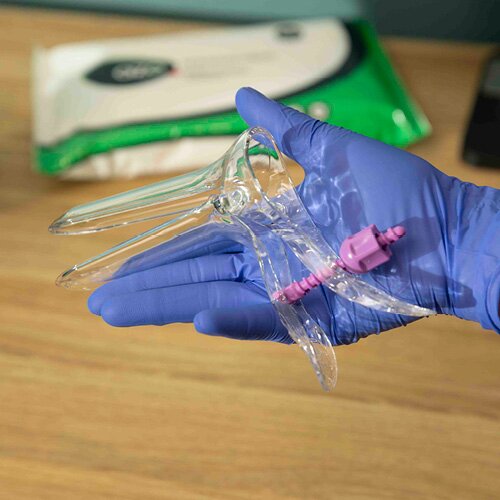
Overcoming The Barriers to Cervical Screening

Overcoming The Barriers to Cervical Screening
It’s reported that 1 in 3 people do not attend their cervical screening, or ‘smear test’ - an alarming statistic given that cervical cancer is the fourth most common cancer in women globally. Ahead of cervical screening awareness week, we wanted to understand more about the reasons why people would delay or avoid booking their cervical screening, delving a little deeper into the experiences of those who have attended their smear test.
Promoted across social media to people who fall under the recommended ages for cervical screening, our survey asked several questions including:
- How anxious were you in the lead up to your smear?,
- Have you previously avoided/delayed booking your smear?’
- How uncomfortable did you find your screening?.
We’ll share some of our findings below, but firstly, let's look at what the smear test actually is and why it is so essential.
The Crucial Role of Cervical Screening in the Modern World
What is cervical screening?
A cervical screening or ‘smear test’ is a brief medical test that checks for any abnormal cells in the cervix. It involves a nurse or clinician using a vaginal speculum and swab to gather cells from the cervix. These cells are then sent away and under go a test for HPV. The cervical screening age is between the ages of 25 and 64, with the test offered to anyone with a cervix.
Cervical screenings are usually carried out by the NHS in the UK, but you can also book in for private cervical screenings if preferred.
What happens during the screening and how long does a cervical screening test take?
When women reach 24.5 they are invited by letter, for their first cervical screening examination and everyone invited should attend. A healthcare practitioner, primarily a nurse will conduct the screening via the GP, or sexual health screening clinics.
During the screening appointment, a small sample of cells will be taken from the cervix, using a swab. The cervix is the opening to your womb from the vagina, and a vaginal speculum is used to open the vagina and access your cervix. On average, the appointment takes around 10 minutes to complete. It will then take between two weeks to one month for you to obtain your cervical screening results, depending on your local healthcare provider.

What are healthcare professionals looking for when conducting a cervical screening?
A smear test is not a test for cancer, it is a preventative measure to check for certain types of human papillomavirus (HPV) that can cause changes to the cells of your cervix. These are called "high risk" types of HPV.
If the cells are not found then there are no further tests and repeat invites will be sent for three-yearly appointments until the age of 64. If HPV cells are found, the sample is checked for any changes in your cervix cells, and a referral for further treatment will be arranged to treat them before they develop into cervical cancer. The rates for successful treatment of HPV is very high.
Why is cervical screening so important?
A cervical screening test is one of the best ways available to protect yourself from cervical cancer. The screening looks for the HPV virus, and certain types of that virus contain the high-risk HPV strains, which can develop into cervical cancer.
The screening is so important as in most instances there are no signs and symptoms, as often the virus in itself does no damage, therefore without the screening women would not know that they have HPV and that they could be at a higher risk of developing cancer.
In many cases the body’s immune system will get rid of the infection naturally. HPV is very common and most people will be infected with it at some point in their life. It can affect all sexual orientations, and anyone that has been sexually active in their lifetime, including those in long term relationships with one partner.
If someone has been affected by HPV over a long period of time, the virus can cause damage and may cause cervical cancer to develop. Smoking can also make it harder for your body to get rid of a HPV infection, meaning smokers have a higher risk of developing cervical cancer.
How many lives are saved through cervical screening each year?
Around 5,000 lives are saved every year through the NHS screening programme, but this figure could be even higher if the rates of early intervention by individuals having regular screening for HPV were increased. Reports from the NHS cervical screening programme state that 68.7% of eligible individuals aged 25 to 64 were adequately screened between 2022 and 2023, a 1.2 percentage point decrease on the previous year, when coverage was 69.9%.3
The Barriers to Cervical Screening: Overcoming Stigma
Jo’s Cervical Cancer Trust, who have done a huge amount of work to raise awareness, and have highlighted some of the barriers they have found. The charity is concerned that over two thirds (68%) of the 2,005 25–35-year-olds questioned say they wouldn’t tell their nurse their smear test worries, with almost half admitting they regularly delay or don’t take up their invitation. Worries about making a fuss (27%), fear of being judged (18%) or thinking their concerns are too silly or small (16%) mean women may instead be avoiding a potentially life-saving test.2
As part of our survey, conducted in April 2024 we asked 295 people on a scale of 1-10 1 being the least, and 10 the most. How anxious did you feel about having a smear test? 39% felt the most anxious about having a smear test, rating how they felt 10 out of 10.
Key Results:
39% of people voted 10 out of 10 for feeling most anxious about having their smear test
62% of respondents where most worried about discomfort
55% of people have avoided or delayed booking their smear test
We went onto ask what are the main causes of anxiety in relation to the smear test? Our respondents ranked their fears around the test in the following priority order: Worried about discomfort (62%) Embarrassment/self-conscious (37.5%) Concerned about the outcome (27%) Unsure who will be performing the test (14%) Uncertain what happens in the procedure (5%).
Worryingly, more people express anxiety around discomfort and embarrassment as much greater concerns than the test's outcomes. Some of the other reasons cited for their concern included, being asked prying insensitive questions about their sex life while there, suffers of prolapse were concerned around access to the cervix, victims of sexual assault, and worries about removing clothes in front of an unknown healthcare practitioner.
55% of people have avoided or delayed booking a smear test
Our research has found that a staggering 55% of our respondents said that they had delayed or avoided booking a test. The most common reason was having a negative experience during their first smear. Other reasons included, being too afraid to undertake the procedure, not knowing what to expect, with other respondents noting past negative experiences making them worried to go for a repeat procedure, inconvenience of appointment times, difficulty accessing services, and being unable to get time away from work.
Is screening painful?
Many women will ask themselves the question, does a smear test hurt? Whilst screening shouldn’t be a painful experience, many women and people with a cervix have reported a number of reasons why they have found the experience distressing.
Some of the reasons reported included: Suffering menopausal and post-menopausal symptoms such as vaginal dryness and vaginismus. Anxiety and fear. The positioning of the womb, if the cervix is in an anterior or posterior position. Using the wrong size of speculum for the patient. Not using enough lubrication. Female genital mutilation.
Strategies for Alleviating Fear and Anxiety Surrounding Smear Tests
Education
The NHS has useful guides and videos available to walk patients through the process of the appointment. Taking time to fully understand what is going to happen could help to reduce the anxiety around the unknown environment of a smear test, particularly for a first screening.
In addition the Eve Appeal charity run a nurse-led information service to answer any questions related to gynecological health, via email, phone, or an online form, and they also offer their support in over 250 languages.
Pre appointment consultations and support
The Survivors Trust and The Eve Appeal have collaborated as part of the #CheckWithMeFirst campaign to help raise awareness of the challenges survivors of rape, sexual abuse and sexual violence may face when accessing cervical screening. Many survivors of sexual assault or sexual abuse find healthcare appointments distressing, particularly appointments which may involve physical examinations such as cervical screening.4 They have created a helpful guide to support survivors of rape, sexual abuse or assault.
A range of speculum options, tailored to the patients’ needs.
A number of respondents expressed that varying sizes were not available during their cervical smear, and that had a smaller speculum been an option that it could have helped the appointment to be more successful. Giving healthcare professionals a selection of sizes and products to be able to best treat women could enable more positive outcomes.
Speculums are available in a range of sizes, and healthcare practitioners should have options to hand to best suit their individual patient's needs.
Many nurses or HCP’s are not aware that there are also specialist options such as the addition of a retractor available to them, which can help to open up the vagina in cases where visibility is impaired, and the speculum alone doesn't suffice. The addition of a retractor can give the healthcare practitioner a clearer view meaning they can complete a test, without the need for a hospital referral.
Let’s Work Together to Improve Cervical Screening Rates
Alarmingly, cervical screening rates are dropping5 , particularly those between the ages of 25-49 when cervical cancer is more common. The cervical screening programme is highly effective, saving the lives of over 5,000 people every year. The NHS has pledged to eliminate cervical cancer by 2040, by increasing uptake of both the HPV vaccine and regular smear tests.7 We’ve highlighted some of the barriers that prevent people from attending their cervical screenings, and whilst it is completely individual choice, the solution lies in further education, better medical equipment, and a vastly improved patient experience.
References:
1. Cervical Screening Awareness Week (macmillan.org.uk)
2. #SmearForSmear and the very real obstacles to cervical screening | Hysterical Women
3. Cervical Screening Programme, England - 2022-2023 [NS] - NHS England Digital
4. Cervical screening for survivors of sexual violence | The Eve Appeal
5. NHS England » Women urged to take up NHS cervical screening invitations
Barriers to Cervical Screening | Jo's Cervical Cancer Trust (jostrust.org.uk)
Cervical screening uptake - GOV.UK (www.gov.uk)
What is cervical screening? - NHS (www.nhs.uk)
Cervical screening for survivors of sexual violence | The Eve Appeal
Cervical screening | Macmillan Cancer Support